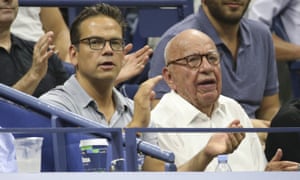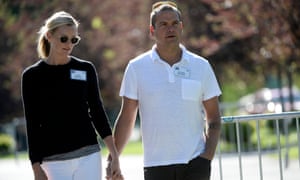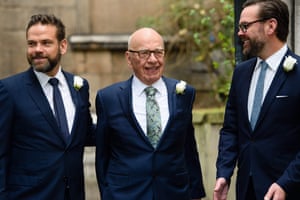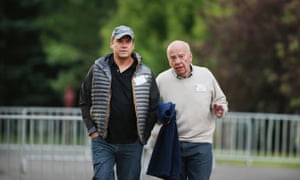Main image: Heir apparent: Rupert Murdoch with his son Lachlan. Photograph: Scott Olson/Getty Images
In the final part of this series, we examine the forces likely to shape Australia’s Murdoch news
empire post-Rupert
Since
Rupert Murdoch’s accident on Lachlan’s yacht, Sarissa, in January, the
power structure inside News has finally tilted toward his son Lachlan,
even if Rupert’s recent visit to Sydney and his role in the Coalition’s leadership changes suggest he’s still a force to be reckoned with.
Lachlan and his brother, James, have been running the global entertainment and news empire comprised of News Corp and 21st Century Fox in a complex power-sharing arrangement since 2015. But insiders say Rupert still has the last word. Lachlan is executive co-chairman of both companies with his father at the helm of News Corp. James is CEO of 21st Century Fox, the entertainment business, which is midway through being sold.
James, the younger son, was once seen as the most likely to step into his father’s shoes after Lachlan withdrew from the family business and moved back to Australia. But the UK phone hacking scandal took the gloss off James and now his part of the empire – 21st Century Fox – is being sold to Disney for $US71m, which would seem to leave him without portfolio in the family business. The parts the Murdochs are keeping will be parked in New Fox, a company also run by Lachlan.
The empire, it seems, will be his.
“I hope my son Lachlan will be CEO,” Rupert said in an interview just before Christmas on the News Corp-owned Sky News Australia, as he discussed the future of News Corp after the Disney deal.
"This is returning to our roots, which is news and sports"
There’s been much analyst speculation about whether the downsizing is an acknowledgement the empire is too big and unwieldy to be run without the genius and authority of Rupert.
“I think this is returning to our roots, which is news and sports. We are pivoting,” Murdoch Sr said in the Sky interview.
The downsized empire will be focused on News’s traditional news business – newspapers, online real estate, book publishing and Foxtel – alongside a growing portfolio of sporting rights, to which it added cricket rights in Australia in April.
The Murdochs also will hang on to top-rating Fox News channel in the US and Fox sports cable channels after the Disney sale.
The Murdochs had also hoped to keep the UK satellite TV service, Sky, and take full control but met resistance from UK regulators concerned about the extent of the Murdochs’ media influence, and was ultimately outbid by Comcast.
So, what will News Corp be like under Lachlan?
When he does, he talks fast with a distinct American accent.
Others have described him as being uncomfortable with small talk and challenging to engage in conversation, but perhaps that reflects an upbringing in the rarefied atmosphere of the Murdoch family, where every personal interaction would be defined by being the boss’s son.
Lachlan is said to be very close to his father. Insiders say he regularly exits meetings with: “I love you Dad,” even in front of other executives.

Lachlan and his brother, James, have been running the global entertainment and news empire comprised of News Corp and 21st Century Fox in a complex power-sharing arrangement since 2015. But insiders say Rupert still has the last word. Lachlan is executive co-chairman of both companies with his father at the helm of News Corp. James is CEO of 21st Century Fox, the entertainment business, which is midway through being sold.
James, the younger son, was once seen as the most likely to step into his father’s shoes after Lachlan withdrew from the family business and moved back to Australia. But the UK phone hacking scandal took the gloss off James and now his part of the empire – 21st Century Fox – is being sold to Disney for $US71m, which would seem to leave him without portfolio in the family business. The parts the Murdochs are keeping will be parked in New Fox, a company also run by Lachlan.
The empire, it seems, will be his.
“I hope my son Lachlan will be CEO,” Rupert said in an interview just before Christmas on the News Corp-owned Sky News Australia, as he discussed the future of News Corp after the Disney deal.
"This is returning to our roots, which is news and sports"
There’s been much analyst speculation about whether the downsizing is an acknowledgement the empire is too big and unwieldy to be run without the genius and authority of Rupert.
“I think this is returning to our roots, which is news and sports. We are pivoting,” Murdoch Sr said in the Sky interview.
The downsized empire will be focused on News’s traditional news business – newspapers, online real estate, book publishing and Foxtel – alongside a growing portfolio of sporting rights, to which it added cricket rights in Australia in April.
The Murdochs also will hang on to top-rating Fox News channel in the US and Fox sports cable channels after the Disney sale.
The Murdochs had also hoped to keep the UK satellite TV service, Sky, and take full control but met resistance from UK regulators concerned about the extent of the Murdochs’ media influence, and was ultimately outbid by Comcast.
So, what will News Corp be like under Lachlan?
Lachlan Murdoch: the prodigal son
Unfailingly polite and somewhat reserved, the 47-year-old is something of an enigma. He has given relatively few public interviews and speeches for a man who has spent more than 20 years at the helm of a major media company.When he does, he talks fast with a distinct American accent.
Others have described him as being uncomfortable with small talk and challenging to engage in conversation, but perhaps that reflects an upbringing in the rarefied atmosphere of the Murdoch family, where every personal interaction would be defined by being the boss’s son.
Lachlan is said to be very close to his father. Insiders say he regularly exits meetings with: “I love you Dad,” even in front of other executives.

Yet Lachlan did the unthinkable and in 2006 walked away from what was widely regarded as the golden path to the top job in News Corp. Instead he chose to start his own media empire, albeit more modest, in Australia.
The catalyst for Lachlan’s departure, according to multiple reports, was a dispute with the Fox Network’s now deceased, but once larger than life, chief executive Roger Ailes over a programming decision on the network. At the time Lachlan was notionally Ailes’s boss in the US. But Rupert sided with Ailes, who had established Fox News, turned it into a money spinner and driven its rightwing agenda.
Insiders say Rupert saw it as a relatively inconsequential decision. After all, Ailes was his programming guru. For Lachlan, though, it was the moment when the realities of the family business structure were laid bare. He decided to return to Australia.
In that decade in Australia, Lachlan went on to forge his own media company with varying degrees of success. He bought into Nova Entertainment, a radio group, and eventually took full control. It has been a ratings success and a solid, profitable investment.
His foray into the third-rating Ten network was less so. He brought in fellow billionaires James Packer and Gina Rinehart, and began a number of experiments to try and turn the network around.
Insiders say it was a chaotic ride, with programs going to air too early before they had been properly refined, and the shareholders’ rightwing agenda (Gina Rinehart and James Packer were also investors) leading to a push to put programs like the Bolt report, helmed by Andrew Bolt, into a schedule that was focused on the youth demographic.
Chief executives came and went leaving Lachlan to take on an executive chairman role.
This would have had the advantage of giving Sky a much bigger audience, while saving significant costs at Ten. But it meant the minor shareholders – Ten was publicly listed –and those owed money would lose almost everything. The US network CBS, which was owed money for programming, decided to bid itself, rather than wear the loss.
Ten’s staff, fearing their jobs were on the line and who made up the bulk of the creditors in numbers showed there was no great love for their former proprietor, and voted for the CBS offer, which claimed the prize.
It was an embarrassing misstep for Murdoch and Gordon.
“They just didn’t see it coming,” says one insider.
There was also Lachlan’s ill-fated foray into OneTel with fellow mogul James Packer. It too went into receivership in 2001 after the pair agreed to inject more than $700m into the company.
But Lachlan has had some other notable successes. The $10m that he convinced his father to invest in Realestate.com.au 16 years ago, is now worth $4.33bn and is providing healthy profits.
‘Vigorous conservatism’
During Lachlan’s time in Australia he also established some of his own political connections. Said to be even more conservative than his father, Lachlan gravitated to that side of politics.
The relationship endures.
Over the past month the Australian has taken up the cudgels in defence of the Ramsay centre for western civilisation, a project that includes Abbott and John Howard on its board.
According to the Australian’s former editor Chris Mitchell, Lachlan is politically further to the right than Abbott.
In his autobiography Making Headlines he recounts that Lachlan backed the execution of two of the Bali Nine on drug trafficking charges, and he had seen Abbott’s compassion as misplaced.
“As with his views on gun control in the United States, Lachlan’s conservatism is more vigorous than that of any Australian politician, Abbott included, and usually to the right of his father’s views,” he wrote.
Like his father, Lachlan is said to be a climate change sceptic, though there is little he has said publicly on the subject.
This stands in sharp contrast to his brother, James, and Kathryn, James’s wife, who promote action on climate change.
In the few public speeches Lachlan has given in Australia he’s focused on many of the issues that the News Corp holds dear: the right of the media to be free of government influence and regulation; abolishing laws that impinge on unfettered free speech such as section 18C and a disdain for the elites.
He often refers to the legacy of his grandfather Sir Keith Murdoch, who flouted the UK censors to report on the true state of the battle at Gallipoli. And like his father he was a strong backer of the war in Iraq, while publisher of the New York Post.
He also shares the News Corp distaste for the elites, even though he belongs to the most rarified of elites: the billionaire’s club in both Australia and the US.
"The profit motive is not only fundamental to our ability to reward shareholders and pay employees, it's fundamental to excellent journalism"
At the 2002 Andrew Olle lecture Lachlan took on Eric Beecher, publisher of Crikey, who had given the lecture two years earlier. Beecher had sought to distinguish between the “commercial media” driven by the need to make money, and “the serious media”, which he defined as those whose journalism is subsidised like the ABC via taxpayers and the broadsheets, though classifieds.
“You can see here that the Australian media elite define their club through standards designed only to exclude,” Murdoch said. “Entry requires that you rely on taxpayers money to draw your pay cheque or that your newspaper folds twice over and god forbid, don’t ever even think about a profit.”
The young Murdoch fumed at what he saw as a slight against News, even though ironically, the Australian remains the last broadsheet newspaper in Australia.
“Our lack of loftiness is a point of distinction.”
“The profit motive is not only fundamental to our ability to reward shareholders and pay employees, it’s fundamental to excellent journalism,” he said.
In line with this world view, Lachlan is one of the movers and shakers behind the News Corp push to convince the Coalition government to further corral the government-funded ABC, though budget cuts and potentially, changes to its charter.

Whereas James is prepared to characterise its overtly conservative leanings as a business decision, Lachlan appears more passionate in his support of the Fox News agenda.
“Is the New York Times fair and balanced? Lachlan retorted, when asked by Business Insider’s Henry Blodget about balance.
Both brothers insist that at Fox News there Is a clear distinction between news reporting and commentators – and that the news content is indeed fair and balanced.
As for the unadulterated diet of rightwing commentators during prime time – Sean Hannity, Tucker Carlson and Laura Ingraham – Lachlan maintains it’s smart business.
“There was a gap on the centre-right in the media,” Lachlan told Blodget. “Fox News serves that audience.”
He rejected Blodget’s suggestion that Fox had become “state TV” under Trump adding that media had to get behind ideas and concepts.
And no wonder he defends it. Fox News is the most watched cable news channel in the US, with nearly 2.4m viewers on average during prime time. The Trump era has seen its ratings surge and it’s a big money spinner for News Corp.
‘Sky turns into a werewolf after dark’
Whether the Fox News model can work in Australia on Sky News with its smaller audience and less polarised polity remains to be seen.Until a year ago Sky News Australia had been a niche breaking news service, watched predominantly by political and business junkies, with a mix of commentators at night, though with a definite leaning towards the right.
But insiders say there’s been a noticeable editorial shift that coincided with News Corp acquisition of 100% of the pay TV news channel.
During the day, Sky remains a breaking news service. Its political editor, David Speers, enjoys a reputation as a searching and fair interviewer.
“Sky turns into a werewolf after dark,” says one political commentator who asked not to be named. “The transformation is happening earlier and earlier.”
The Sky evening lineup from 6pm is now sharply rightwing: Peta Credlin, Andrew Bolt, Alan Jones, Ross Cameron and Paul Murray.
Sky morning presenters are encouraged to run excerpts from their night-time colleagues during news programs.
“I think that’s more to do with branding, but it means the rightwing views are spreading through the schedule,” says one insider.
“I don’t think it was necessarily what Angelo wanted – it’s not part of his value set – but he understands what his masters want,” says the insider, referring to the former Sky boss Angelo Frangopoulos who is leaving to run Sky Middle East.
Lachlan is said to be the driver of the new direction. Bolt and Credlin have direct lines to Lachlan, says the insider.
It’s caused enormous tensions at the station between the daytime news staff who have at times called out the rightwing ideology and outright activism of the nighttime lineup.
The duality has split the audience too. The trouble is the political class tunes out at 6pm, says one insider. “The right lineup gets rid of sensible viewers,” he says.
Meanwhile News is pursuing a strategy to extend the reach of Sky. Last month it began showing a Sky highlights package on Bruce Gordon’s Win TV. It’s likely another deal will follow for city markets.
That will give Murdoch the means to turn Sky into the Australian equivalent of Fox News, taking it beyond a niche service watched by the political and business elites and into most lounge rooms.
News Corp: the next generation
Where News may change under Lachlan is in its management style and its notoriously blokey culture.When the revelations about sexual harassment by Roger Ailes broke, Rupert, his great protector, was on his honeymoon, with his fourth wife, Jerry Hall. Lachlan ordered an swift inquiry by a law firm and Ailes was shown the door within 13 days.
“I think it’s been a fantastic development,” Lachlan said of the #Metoo movement in the interview with Business Insider. “It is completely unacceptable for powerful men to act in this way.”
But others see Lachlan’s swift action on Ailes as motivated by personal enmity, and feel that they too fell foul of what they see as his capacity to bear a grudge against those who have crossed him. This was mentioned by a number of ex-News Corp executives. There had been no blow-up, no angry words when they crossed Lachlan. But several believed Lachlan had moved against them months later.
Whereas Rupert Murdoch’s exercise of power within the company depends on close personal relationships with his editors and executives, with whom he relishes sharing news tips and gossip, Lachlan and James have demonstrated that they approach management differently.
Lachlan has promoted women to executive positions. Siobhan McKenna, his representative on the Ten board, is now in a key executive position in the Australian operations at Foxtel.
But it remains to be seen how far any potential cultural shift in management will be reflected in the tone of News’s coverage and campaigning. Will politicians come to no longer fear an organisation that is run on more conventional lines?
News is quietly reshaping its influence in the Australian media landscape, expanding the footprint of its Sky News service, and rumours persist it is still looking at a potential free-to air-television acquisition, despite denials from News. Without the entertainment assets, the Murdoch family can be increasingly focused on its traditional game of running a media company with a strong conservative voice.

No comments:
Post a Comment